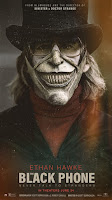Thanks to a movie called Nope playing in area movie theaters, I actually had the following conversation with myself a week ago: "Are any movies playing in the area that look good?" "Nope." "OK, I'll stay home and read, then." Ha, ha. I was still thinking about seeing Nope this past weekend, but when it came time to decide, I decided on The Black Phone after all. I had watched online trailers for both movies and I guess the concept for The Black Phone thrilled me a bit more.
The movie takes place in the Denver area in 1978, when people's phones hung on walls, plugged into a jack, and had handsets connected to the receiver by a curly cord. A phone like this hangs on the wall of the soundproofed basement where Finney finds himself after he becomes the sixth victim of a serial kidnapper, abuser and murderer of teenage boys, known in the local press as the Grabber. The phone's cable (connecting it to the jack) has been cut, but that doesn't stop it from ringing now and then, and when Finney answers it, he hears the voices of the Grabber's previous victims giving him tips about how to survive. Meanwhile, his sister Gwen (who sometimes has dreams that come true) is also dreaming about the five kids the Grabber grabbed before Finney, and each dream brings her closer to being able to identify the house where her brother is being held.
The Grabber plays a sick game with these kids, and in a way, Finney is the perfect victim because when it comes to schoolyard bullies, he never fights back. But as the ghost of his best friend (the previous victim) points out, he's also a tough kid who takes a beating and gets back up. He just needs to nerve himself to fight because his dead buddy is relying on him to live.
Perfect victim, maybe, but he's also the Grabber's most troublesome one, drawing blood when he's snatched off the street (none of the others managed that), very nearly escaping (he gets heartbreakingly close), and finally ... well, telling would spoil it for you. In his fear and in his low point of despair, Finney has a vulnerability that'll go to your heart. Most of the time, however, he is remarkably calm and he really works hard to survive.
In a similar paradox, Gwen often seems like such a sweet, fragile thing, but boy! does she have a mouth on her, as seen when she cusses out the cops who grill her over a dream in which she saw images of one of the kidnaps including details the police never released to the public. She doesn't hold back from Jesus, either, going from humbly praying for a helpful revelation to (at one point) rudely challenging him to prove He exists. Her search for her missing brother runs parallel to his ghost-guided preparation for a final opportunity to either escape or die -- and neither proceeds in a straight line.
It's an emotionally wrenching thriller with enough jump scares, ghostly apparitions and one really icky on-screen murder to keep it just inside the "horror" box. The exquisite creepiness of the Grabber doesn't hurt. It's also weirdly uplifting in the sense that you see the hero kid, Finney, trying all the dead kids' suggestions in the hope that they'll get him out of there, but none of them turn out as he expects or hopes. It's only at the point where he completely gives up that it starts to become clear exactly how each of their hints will help him survive.
Based on a short story by Stephen King's son, Joe Hill, the movie is directed by Scott Derrickson, who also helmed such pictures as The Exorcism of Emily Rose, Sinister and Doctor Strange. The movie casts Ethan Hawke against type as the creepoid; he manages to project a broad range of expression (all within the parameters of a terrifying psycho) while most of the time covering his face in one of a few horrible masks, which is why it's worth paying for an A-lister in a role like this. His coked-up brother, Max, is played by James Ransone of The Wire, Sinister and It Chapter Two, with a manic innocence (his eyes really are an asset) epitomized by the Grabber's line, "He was an idiot, but he was my idiot." The hero kids' abusive, drunk father is played by Jeremy Davies, a.k.a. Upham in Saving Private Ryan, Charles Manson in Helter Skelter and Dickie Bennett in Justified -- accomplishing, as he frequently does, the feat of making you loathe him and pity him at the same time.
Three Scenes That Made It For Me: (1) Finney's escape attempt and its agonizing conclusion. (2) Fighting lessons via phone with a ghost. Actually, the whole scene in which Robin talks Finney into fighting to survive was the tear-jerking heart of the movie. (3) The moment Max looks at the bulletin board where he's been following the Grabber investigation (thinking his help will be valuable to the police) and you see the penny drop in his eyes. Actually this movie is pretty good at showing what its characters are thinking without a word of dialogue, like Gwen wondering whether what she's seeing is real, or Finney's crush/science lab partner hearing the news that he's been snatched. But you've gotta admit that playing the scene where a doofus comes out of his mental haze long enough to realize, "You know what? My brother could be the Grabber," is an acting assignment that's worth the inconvenience of taking an axe in the head (oops, spoiler).
Monday, August 1, 2022
Subscribe to:
Post Comments (Atom)








No comments:
Post a Comment